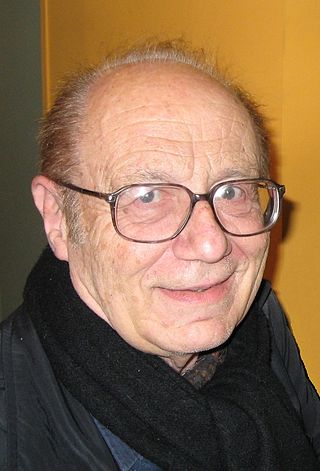French literature generally speaking, is literature written in the French language, particularly by citizens of France; it may also refer to literature written by people living in France who speak traditional languages of France other than French. Literature written in the French language by citizens of other nations such as Belgium, Switzerland, Canada, Senegal, Tunisia, Algeria, Morocco, etc. is referred to as Francophone literature.

Pascal Quignard is a French writer born in Verneuil-sur-Avre, Eure. In 2002 his novel Les Ombres errantes won the Prix Goncourt, France's top literary prize. Terrasse à Rome, received the French Academy prize in 2000. In 1980 Carus had been awarded the Prix des Critiques. He also won the 2023 Prix Formentor.
The Prix Décembre, originally known as the Prix Novembre, is one of France's premier literary awards. It was founded under the name Prix Novembre in 1989 by Philippe Dennery. In 1998, the founder resigned after he disapproved awarding of the prize to Michel Houellebecq's novel Atomised. The prize then got a new patron – Pierre Bergé – and a new name: Prix Decembre.

Annie Thérèse Blanche Ernaux is a French writer who was awarded the 2022 Nobel Prize in Literature "for the courage and clinical acuity with which she uncovers the roots, estrangements and collective restraints of personal memory". Her literary work, mostly autobiographical, maintains close links with sociology.

Richard Millet is a French author.
Pierre Bergounioux is a French writer. He won the 1986 Prix Alain-Fournier for his second novel, Ce pas et le suivant. And in 2002, he won the SGDL literary grand prize for his body of work.
The Prix Alain-Fournier is a French literary prize, awarded by the town of Saint-Amand-Montrond in honour of Alain-Fournier, author of Le Grand Meaulnes. It is intended to give encouragement to a novelist at the beginning of their career, and it can be awarded for first, second or third novels, provided that the author has not previously received any recognition at a national level.

The Map and the Territory is a novel by French author Michel Houellebecq. The narrative revolves around a successful artist, and involves a fictional murder of Houellebecq. It was published on 4 September 2010 by Flammarion and received the Prix Goncourt, the most prestigious French literary prize, in 2010. The title is a reference to the map–territory relation.

Philippe Rahmy was a Swiss poet and writer.
European Prize for Literature is a European-wide literary award sponsored by the city of Strasbourg with support from the Ministry of Foreign and European Affairs (France). The prize is awarded by the Jurys des Grands Prix Littéraires, in Strasbourg, at the same time as the Prix de Littérature Francophone Jean Arp and the Prix du Patrimoine Nathan Katz.
The Grand prix de littérature de l'Académie française is a French literary award, established in 1911 by the Académie française. It goes to an author for their entire body of work. Originally an annual prize, it has since 1979 been handed out every second year, alternately with the Grand prix de littérature Paul-Morand.

Michel Deguy was a French poet and translator.
The Prix de la langue française is chronologically the first grand prix of the literary season in France.

Hédi Kaddour is a French poet and novelist.
The grand prix de littérature de la SGDL is a French literary prize created by the Société des gens de lettres in 1947 in order to reward an author for the whole of his work, and which is given during the spring session of the society.

Pierre Bourgeade was a French man of letters, playwright, poet, writer, director, journalist, literary critic and photographer. A descendant of Jean Racine, he was also the brother-in-law of the writer Paule Constant.
The grand prix de la Critique littéraire was created in 1948 by Robert André. It is awarded each year by the French PEN club to a literary essay. Chaired by Joël Schmidt, its jury is now made up of Jean Blot, Jean-Luc Despax, Jean-Claude Lamy, Daniel Leuwers, Jean Orizet, Laurence Paton, Antoine Spire and Patrick Tudoret. Since its creation, it has rewarded many leading authors and intends to promote a literary criticism of quality and, quite simply, literature.

Michel Caffier was a French journalist, writer, and literary critic. He is the author of an abundant work centered on Lorraine: historical novels, essays and reference works, including the Dictionnaire des littératures de Lorraine.

Jean-Pierre Makouta-Mboukou was a Congolese politician, academic, novelist and playwright. For his abundant and eclectic work his biographers have called him the “Congolese Victor Hugo” and the “baobab of Congolese literature”.









